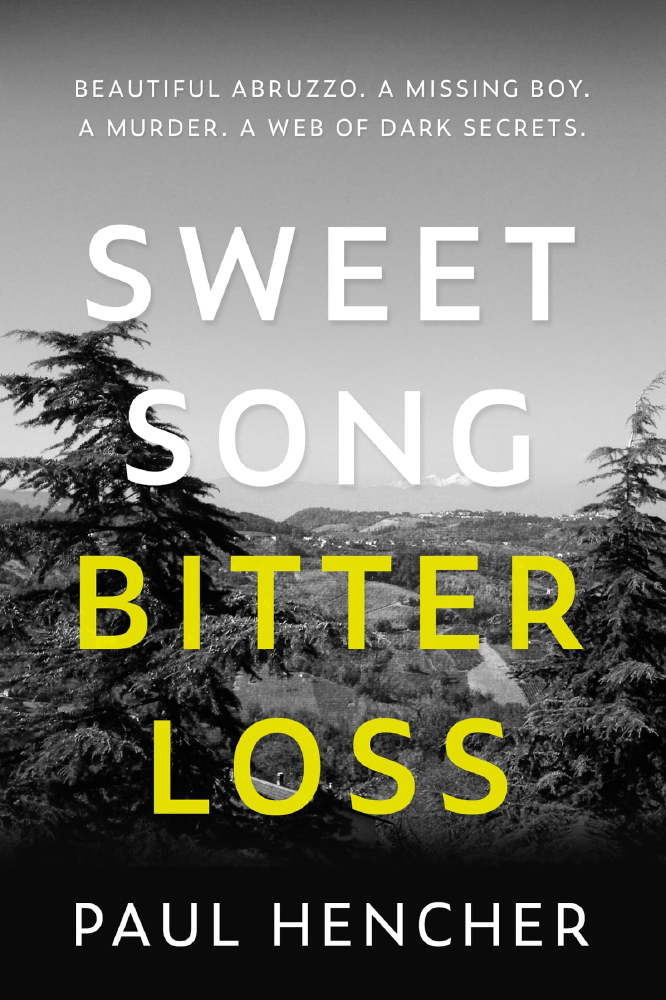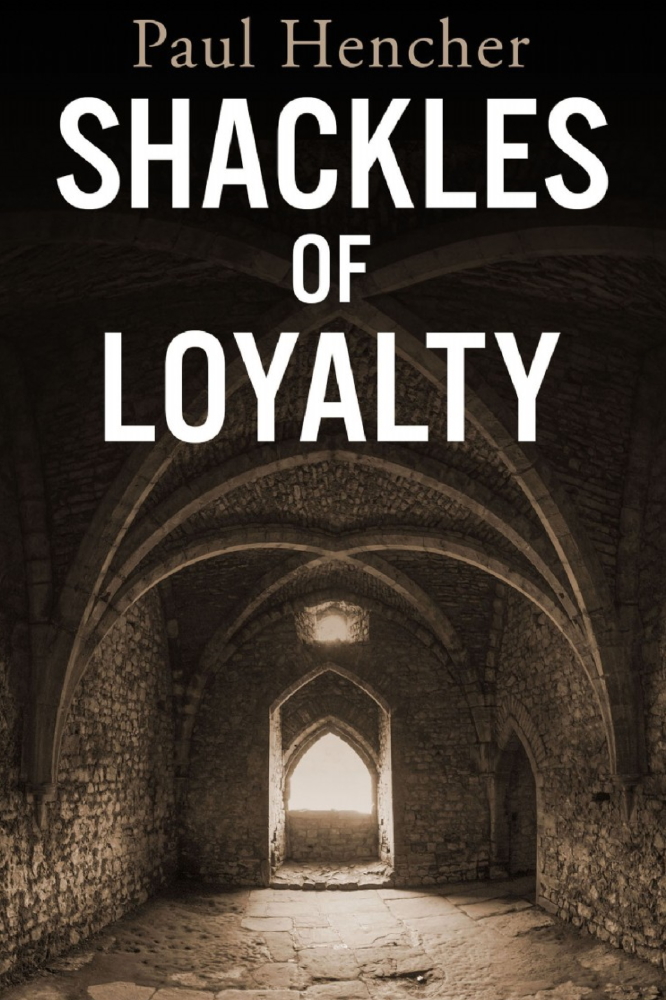Oxford has Inspector Morse and now Abruzzo has Major D’Angelo – the new Italian crime fighter that will have you shouting ‘brillante’! In this exclusive interview we speak to the detective’s creator, author Paul Hencher, about his writing career and his plans for the Major D’Angelo Mysteries trilogy, which commenced in (Italian) style earlier this year with Sweet Song, Bitter Loss.

Author Paul Hencher
Q. How did you come up with the idea for your new novel, Sweet Song, Bitter Loss?
A. This is a slightly tricky question to answer, because although the trigger for the story was one of my frequent ‘what if’ moments, to divulge the specific thought that came to me while walking with my dog through the woods would be a major spoiler. Suffice to say, the ‘what if’ led to ever darker machinations, with dire consequences for some of the characters. I have a vivid imagination, so I’m forever seeing bleak results from benign situations.
Q. What do you think readers will enjoy most about your new novel?
A. I sometimes discuss with my wife, Maggie, books that we have both read, to discover that we enjoyed different facets of the same book, or else that one of us liked the book while the other gave up on it. I think people will pick up on different aspects of Sweet Song, Bitter Loss. Some will like the flavour of life in rural Italy, others will enjoy the suspense of not knowing how matters are likely to resolve. I was pleased to see one of the reviews mention feeling the full gamut of emotions, as I included lighter moments among the dark; humour with the tragedy. If readers feel that they have come to know the characters, and that they could imagine sitting at the next table in the piazza sipping an espresso or cappuccino, I will consider I have done a decent job.
Q. A lot of readers have praised you for weaving in impressions of rural life in Italy. Why do you think this has gone down so well, especially in a work of crime fiction?
A. Recording some of my impressions of life in this part of Italy was a crucial aspect of the book. It’s pleasing to note that compliments have come from both people who know the region along with those who don’t, the latter group intrigued to learn more. For some writers, it’s all about action and the characters in anonymous settings, such as Lee Child’s exciting Jack Reacher books; for others the setting is important. I have used the rather unusual backdrop of rural Abruzzo as an integral element of the novel, hopefully not in an intrusive way but sufficient to give a flavour of where events are unfolding.
Q. You have travelled widely across your life. Why did you decide to move to, and settled down in, Abruzzo in Italy?
A. It’s true that I lived in quite a few different parts of the world when I was young, and having been born in Egypt, I’m somewhat impervious to heat. The decision to come to Italy was a lot to do with stretching limited finances further than was possible in UK, thus allowing for an early retirement. We discovered Abruzzo thanks to Maggie’s enjoyment of television programmes such as A Place in the Sun, on which she saw a visit to Abruzzo, a region we previously knew nothing about. It led us to a part of Italy that was greener than lands to the south, with snow-capped mountains and sparkling sea, possessing a greater proportion of land protected by national parks than any comparable region in Europe, and a slow, easy-going lifestyle. Need I say more?

Q. To someone who has never been to Abruzzo, what is life like there?
A. Compared to much of the UK, roads are far less busy (but becoming busier); behaviour in public, including outdoor evening events, is more respectful and less threatening; and you can take as long as you like to sip your coffee inside or outside the local bar. On the other hand, bureaucracy and officialdom can be a nightmare; timekeeping is an unknown concept; treatment of animals is often cruel, but rapidly improving; and businesses closing from lunchtime until four o’clock can be frustrating. One realises after living here for some time just how different are British and Italian cultures. Oh, and you can’t get decent tea, and don’t ask for a pineapple topping on your pizza, unless you’re keen to learn some Italian expletives.
Q. You have only been writing novels for around a decade. What was the trigger point for wanting to become an author?
A. It was the belief that this was something I could actually do quite well, having not achieved much success in other ventures! The ability to write a novel became a form of redemption.
Q. You have previously written an historical novel, Shackles of Loyalty. What can you tell us about it?
A. In the background of Shackles of Loyalty lies the threat of an attack by a Franco-Scottish force on a castle commanded by the Earl of Northumbria’s son, but at the heart of the story is a tussle between the earl and a powerful abbot. The abbot fears that his privileged lifestyle might be threatened if an outspoken freeman stirs up popular unrest by bringing people’s attention to the Church’s excessive wealth. The abbot demands that the earl condemns to death the man he regards as a troublemaker, but the earl feels shackled by the loyalty he owes to someone who gave him invaluable service many years previously.
Q. How does your experience of writing a crime thriller differ from that of writing a work of historical fiction?
A. There are actually more similarities than differences. Both my historical fiction, Shackles of Loyalty, and the modern thriller, Sweet Song, Bitter Loss, involve crime and intrigue, and both explore good and bad aspects of human behaviour. The more obvious differences revolve around method and speed of travel and communication, form of speech, and everyday things we now take for granted, such as always knowing the time of day.

Q. Your new novel is the first of a series, ‘The Major D’Angelo Mysteries’. What is there within the setting and principle characters that make you eager to tell further Italian-based crime stories?
A. I know that these days it’s possible to make virtual journeys anywhere in the world, but I think it’s only by living in a particular community that one can understand sufficiently the subtleties and minutiae to be able to write about it.
I was keen to write the second of the Major D’Angelo Mysteries, A Secret Never To Be Told, because there was unfinished business from Sweet Song, Bitter Loss that needed resolving. I also wanted to develop the main characters further.
I particularly enjoy introducing strong female characters, so I was pleased with the roles played by Laura, Giovanni’s sister, and the brave Vietnamese girl, Maria, who defies her tormentors. Sergeant Teresa Rossi goes from strength to strength in the second book, while D’Angelo receives help from a surprising protagonist.
Q. Which character in Sweet Song, Bitter Loss do you identify most with, and why?
A. It was only after I had finished writing Sweet Song, Bitter Loss that I realised Giovanni could have been myself as a young boy. Growing up in Cyprus, I was something of a free spirit, investigating the natural wonders of the countryside and the sea. I asked my wife, Maggie, if she thought there was a character that could have been based on myself, and straight away she correctly identified Giovanni.
Q. What is the next Major D’Angelo novel you are working on, and what can you tell us about it?
A. I am intending that the Major D’Angelo Mysteries should be a trilogy. The second book, A Secret Never To Be Told, finds D’Angelo and his team trying to unravel the enigma of why a young mother is brutally killed in her apartment. The fact that she is a refugee from Syria points the finger of suspicion towards a secretive and strange neo-fascist gang. Sergeant Teresa Rossi is drawn into Captain Luciani’s dangerous obsession with finding out whether their newly-appointed political master is involved with the criminal boss of a Pescara casino.
I am now working on the third book of the series, in which there are security concerns surrounding a forthcoming conference being held in Abruzzo for countries at risk from the effects of climate change. Teresa Rossi is thrust into an even more dangerous situation, and there are tragic times ahead for the D’Angelo team.

Q. What is the one key piece of writing advice that you swear by?
A. My key principle is to aim for three ‘bulls’ : credi-bull, accessi-bull, enjoya-bull.
Q. What for you is the essential ingredient of a gripping crime thriller?
A. For the reader to be unaware what will happen from page to page until the final revelation.
Q. Which authors do you admire the most, and why?
A. Authors I admire include Alex Scarrow for his ‘DCI Boyd’ series, involving fast-moving plots and superbly drawn characters, Robert Harris, Clare Francis, Bernard Cornwell and JK Rowling for excellent writing in their various genres, and Clare Mackintosh for her surprising and dramatic twists (as well as for having acted in a pantomime I directed when she was about ten years old!).
Q. Do you think you will return to historical fiction at some point?
A. Definitely. I have come across some old papers that give an explosive insight into events in our history almost one hundred years ago.
Sweet Song, Bitter Loss by Paul Hencher (Matador), is available on Amazon or via the publisher in paperback and eBook editions, priced £9.99 and £3.49 respectively. For more information, visit www.PaulHencher.com.
Tagged in Books

